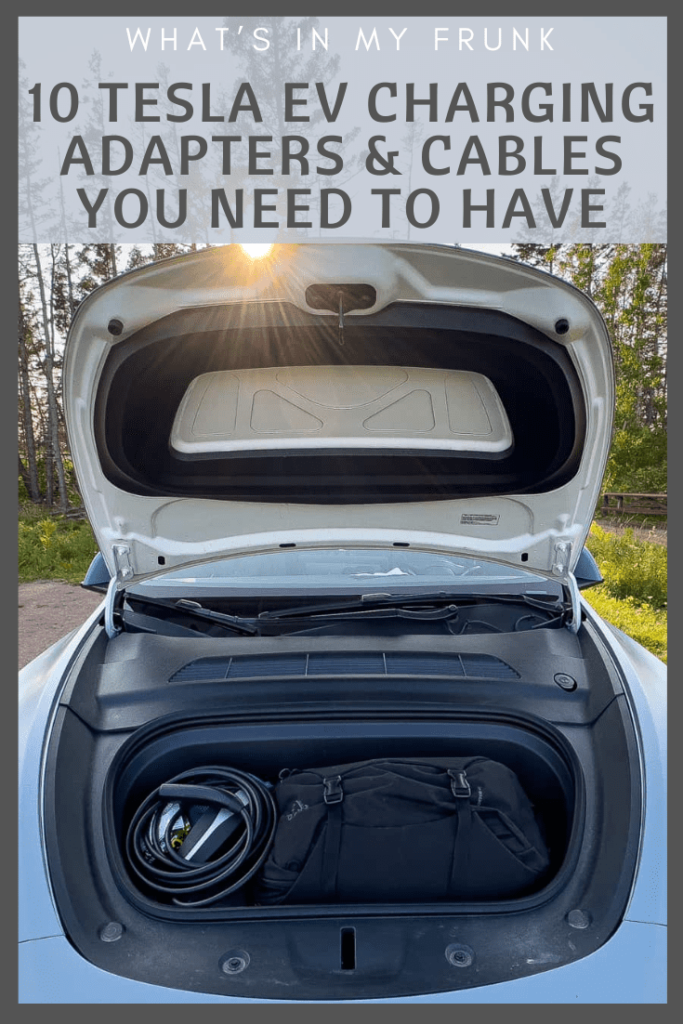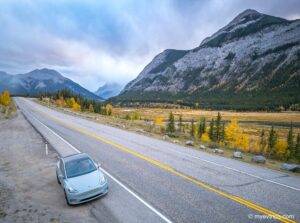Depending on where you live or where you are going, having the right EV charging adapters is key to unlocking off-the-beaten-path road trip destinations. They can also serve as a backup should plans change.
Although many vehicle manufacturers are switching to the North American Charging Standard (NACS), also known as Tesla’s charging standard, there are still plenty of other options out there. After several trips across the continent, I have narrowed down the necessities to use third-party chargers and will share exactly what is in my frunk.
In this post, will explore what Tesla charging adapters you should carry along with extension cords and cables to go with them. From the best Tesla CCS adapter to the basic Tesla to J1772 adapter, we’ve got you covered. These are our picks for the 10 best Tesla EV charging adapters and cables you need to have.
1) Tesla Mobile Connector
This may seem obvious but the very first item on this Tesla charging adapters list that you need to have is the Mobile Connector.
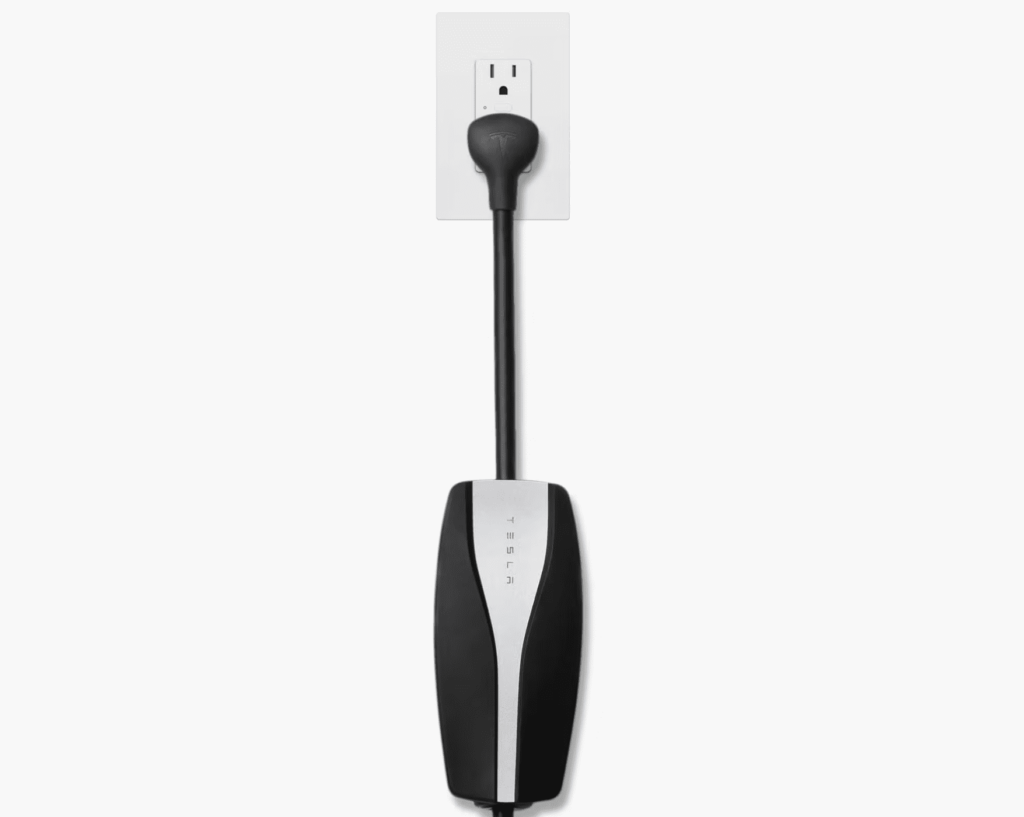
The Tesla Mobile Connector is an essential charging accessory designed for Tesla electric vehicles, enabling convenient charging at various power outlets. This portable charger is versatile, allowing Tesla owners to connect their vehicles to standard electrical sockets.
The Mobile Connector allows you to add adapters for different power sources, such as NEMA 5-15, NEMA 14-50, and others, making it adaptable to diverse electrical systems. Its compact design and ease of use make it a practical solution for Tesla owners to recharge their vehicles when away from dedicated Tesla Supercharger stations, providing flexibility and convenience for EV drivers on the go.
Depending on where you live, shockingly, Tesla does not include this with your purchase. Be sure to add it. Also, depending on your home charging setup, you may want to purchase two; one to have connected at home all the time and one in your car for road trips and emergencies.
2) Nema 5-15 Tesla Adaptor
For North American vehicles, your Mobile Connector will come with a Nema 5-15 adaptor. This is compatible with standard wall outlets and represents the slowest charging option among Tesla EV chargers. When using a standard Tesla charger equipped with a NEMA 5-15 connector, it typically provides an approximate range of 3 miles per hour of charging.
Although not ideal for daily charging, this is one of the most important EV charging adapters simply because, in a pinch, you can find a 5-15 outlet. Also, even if a hotel doesn’t offer EV charging, they may allow you to use an exterior 15 amp plug. I have done this several times and, over a couple of days, left with a full charge.
3) Tesla to J1772 Adapter
The J1772 charging standard is a prevalent method for electric vehicle charging, widely adopted in North America and other regions. As such, having a Tesla to J1772 adapter is a must.
This standard supports Level 1 and Level 2 charging, utilizing alternating current (AC) power sources found in most residential and commercial settings. J1772 charging stations are commonly found in public charging networks, workplaces, and residential areas, contributing to the widespread adoption and accessibility of electric vehicle charging infrastructure.
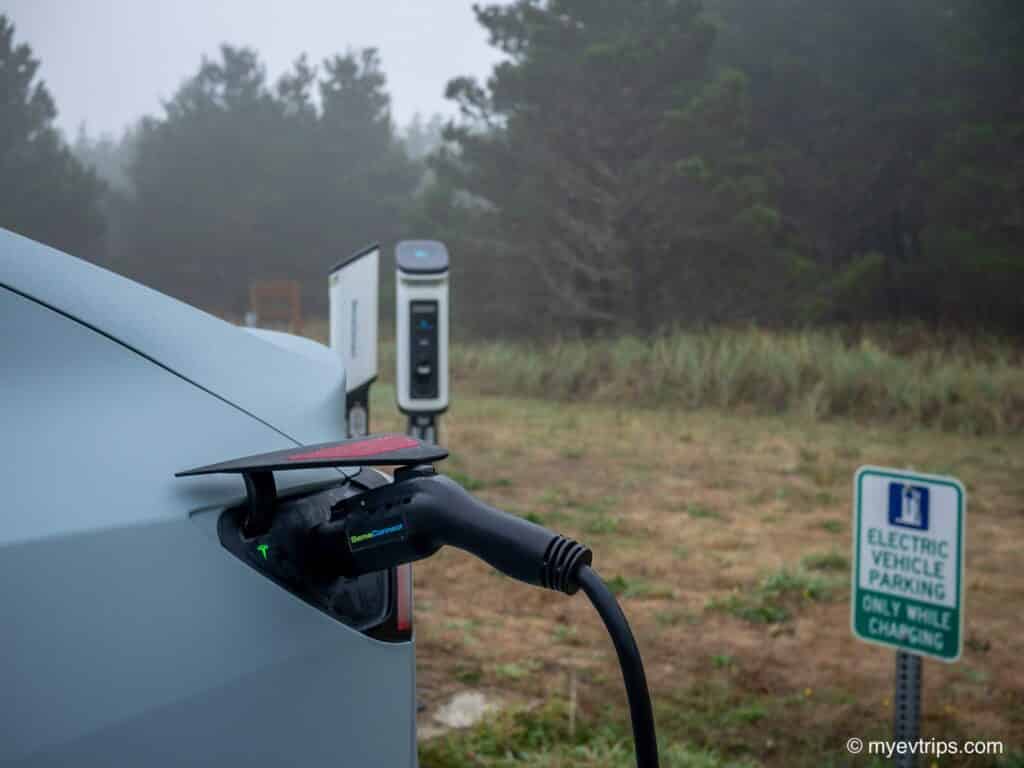
New vehicles do come with a Tesla to J1772 adaptor however, as I have found, it’s a good idea to carry a backup. While I was on a road trip through Oregon, I noticed one of the pins on mine was broken making connecting an issue. I was able to quickly replace this and, since they are inexpensive, bought a second J1772 adapter (currently on sale for $17.50!) to carry as a backup.
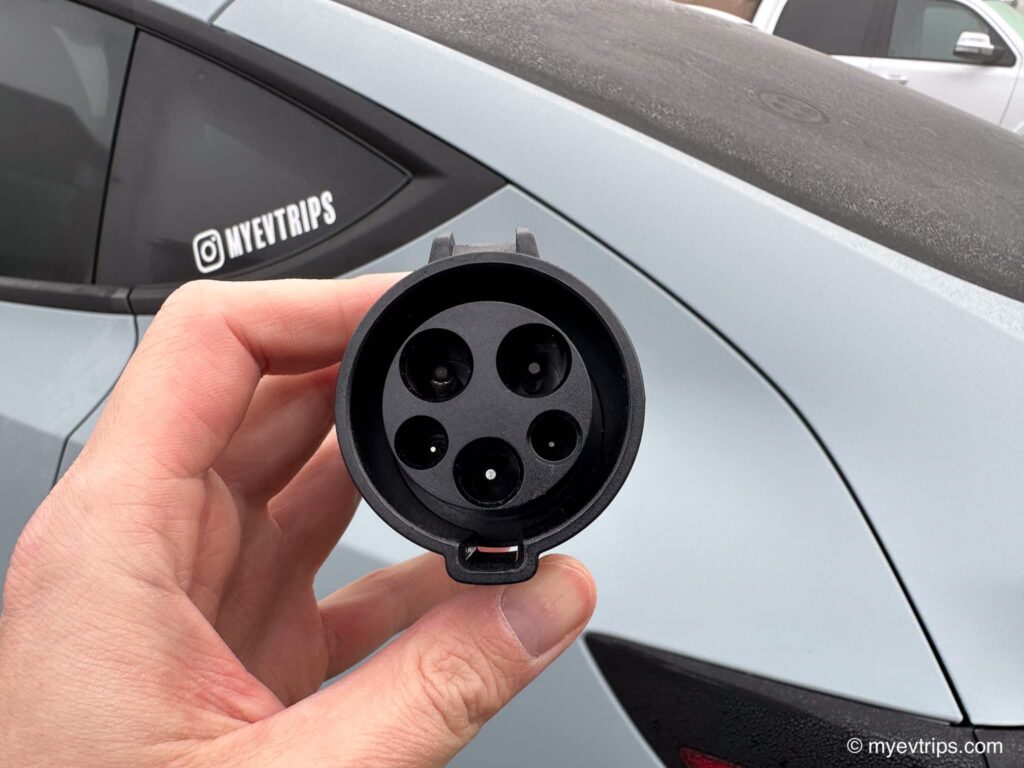
I also suggest picking up a Tesla to J1772 lock. This will prevent “Karrens” from unplugging your vehicle while it is charging.
4) Tesla CCS Adapter
The Tesla Adapter enables Tesla owners to connect their vehicles to fast level 3 Combined Charging System stations, which utilize a different charging standard prevalent in Europe and increasingly adopted in other regions.
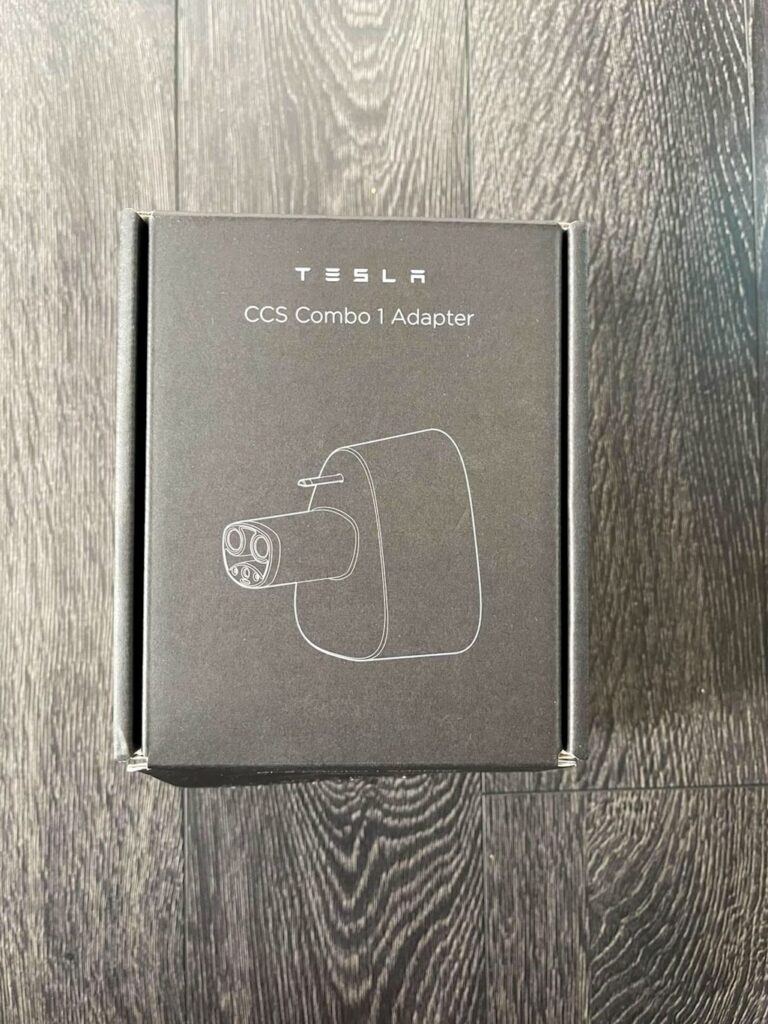
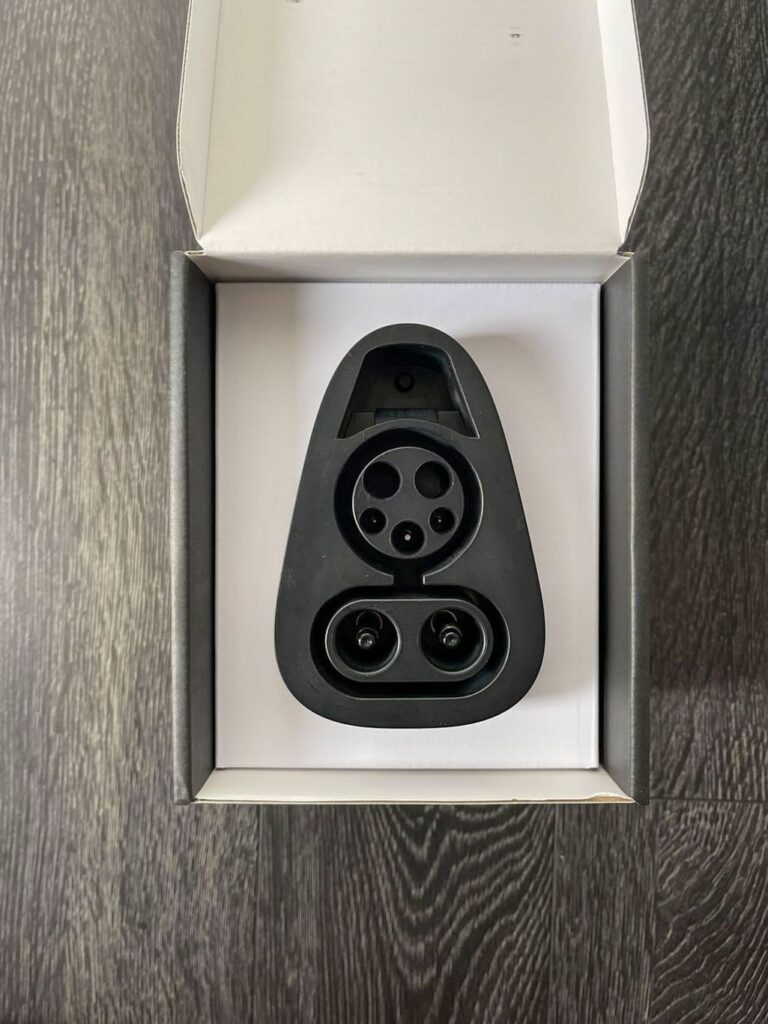
It effectively broadens the charging options for Tesla drivers, enabling them to utilize a more extensive network of public charging stations beyond Tesla’s proprietary Supercharger network.
This adapter enhances convenience for Tesla owners, facilitating seamless access to diverse charging networks and supporting faster charging speeds, thus fostering greater flexibility for long-distance travel and everyday charging needs.
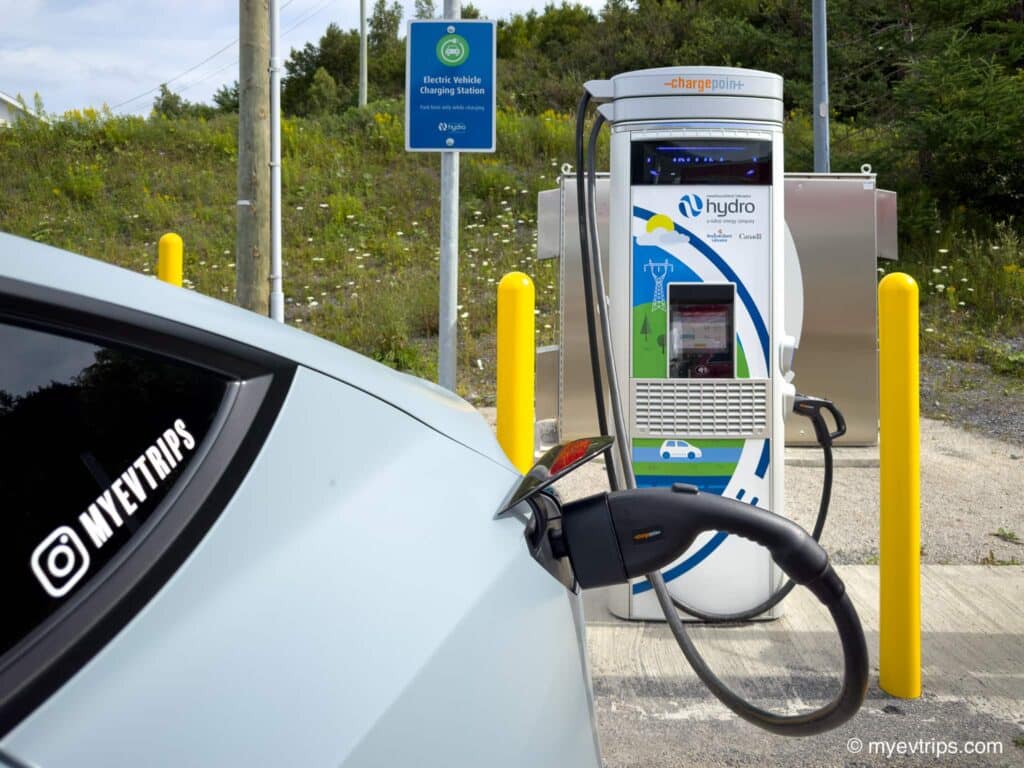
Having a Tesla CCS adapter has been key for getting me to some of Canada’s most remote locations. This has included a road trip around Cape Breton Island, the Gaspe Peninsula, and all covering corners of Newfoundland including an excursion to Saint Pierre, France!
The Best Tesla CCS Adapter
If you are searching for the best Tesla CCS adapter, you can’t go wrong with Tesla’s OEM offering. That said, it comes at a significantly higher cost than what you can find on Amazon. I use one by LaTough which is half the price of Tesla’s OEM adapter and have had no issues. I carry it in this convenient Tesla CCS case which also has a spot for my Tesla to J1772 adapter.
5) NEMA 50A Adapters
Depending on where you live, your Tesla Mobile Connector may include a Nema 14-50 adapter. If not, it’s a good idea to pick up a 14-50 adapter. As of posting this, you can pick up a for under $50
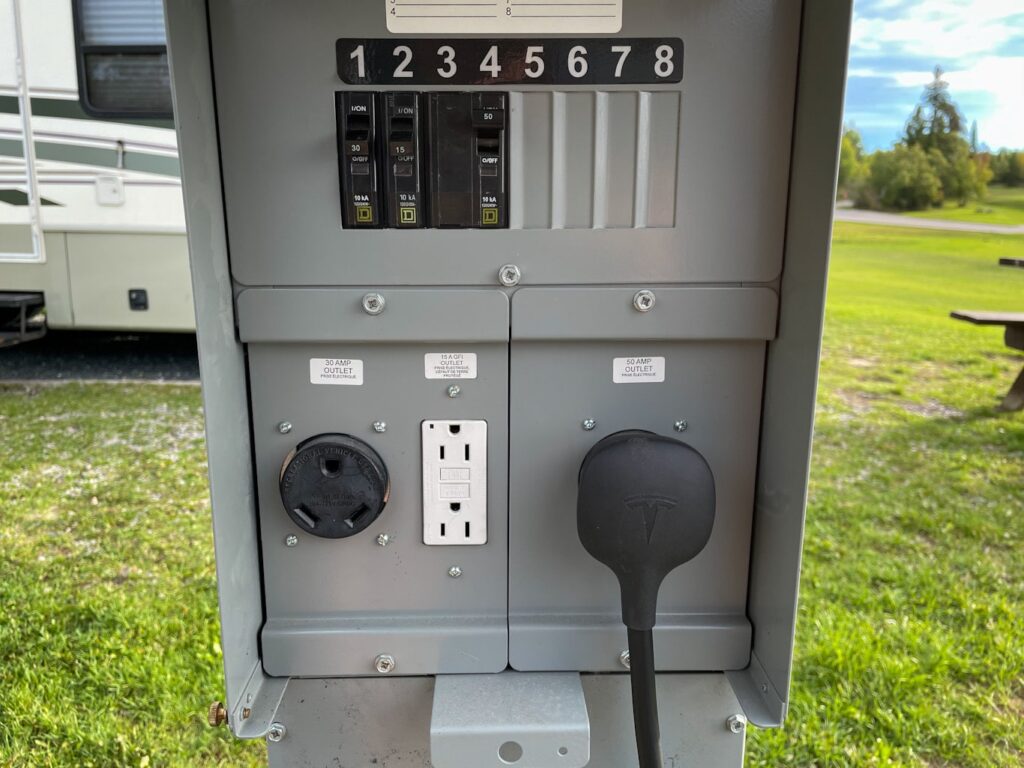
In North America, the second most common NEMA plug for electric vehicles after the NEMA 5-15 is the NEMA 14-50 plug. This plug is commonly used for faster charging capabilities compared to the standard NEMA 5-15 plug. The NEMA 14-50 outlet is a 240-volt outlet, often found in residential settings (ovens and dryers) and RV parks, offering a higher charging rate for electric vehicles.
Also, the Nema 6-50 Tesla Adapter is also a good one to carry. I use this with my mobile connector as my home charging solution.
6) NEMA 30A Adapters
The NEMA TT-30, commonly known as the Travel Trailer 30, is a specific type of electrical outlet predominantly used in recreational vehicles (RVs), travel trailers, and motorhomes across North America.
This 30-amp, 120-volt outlet features three prongs and is often found in campgrounds, RV parks, and some residential settings. The TT-30 outlet allows RV owners to connect their vehicles to electrical hookups, providing a power source for various appliances and devices within the vehicle, such as air conditioning units, refrigerators, or charging ports.
While it’s notably slower compared to higher-voltage outlets used for electric vehicle charging, the NEMA TT-30 remains an essential electrical connection for many campers and RV enthusiasts, offering a reliable power supply during their travels and outdoor adventures.
The TT-30 Tesla 30 amp adapter serves as a crucial accessory for Tesla owners looking to explore and camp.
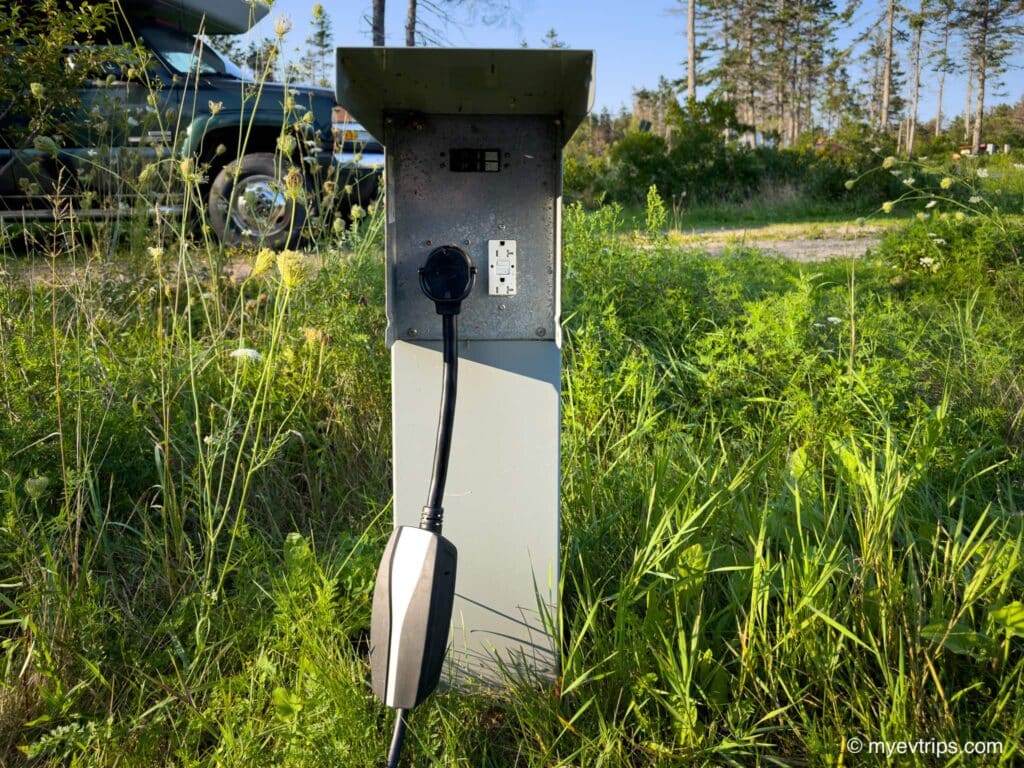
This adapter allows Tesla cars to be charged using a 120-volt, 30-amp electrical system, commonly found in campgrounds, RV parks, and certain residential locations. While the charging speed using a 30 amp adapter is slower compared to higher-powered charging options, it remains a valuable addition for Tesla drivers during travels or when access to standard electrical outlets is the only available option. The adapter enhances the versatility of Tesla’s charging capabilities, providing a solution for owners who require a connection to NEMA TT-30 outlets, ensuring they can conveniently charge their vehicles in various locations.
On my cross-country road trips, I have booked several campsites with 30 amp service. For me, Tesla camping is a fun way to mix in some outdoor fun along with staying in hotels with EV charging. Having a Tesla 30 amp adapter makes this possible.
It is also good to carry a NEMA 14-30 adapter, something I picked up for my trip up the Dempster Highway as a garage on the way has this plug available for use.
READ MORE: Driving an EV to the Arctic Ocean Road Trip Report
7) Tesla CHAdeMO Adapter

The Tesla CHAdeMO Adapter remains a valuable tool despite the declining popularity of the CHAdeMO standard in favour of CCS (Combined Charging System). While CCS gains prominence, having the CHAdeMO Adapter remains prudent for Tesla electric vehicle owners. I have personally used it at third-party charging stations when the CCS stall was in use or unavailable.


Though CHAdeMO’s prevalence may be diminishing, it still holds relevance in several regions and is commonly found in existing charging infrastructures. Carrying the CHAdeMO Adapter ensures Tesla drivers have versatile charging options, enabling access to a broader array of charging stations. That all said, I would only suggest this Tesla charging adapter as a backup to carrying a CCS adapter.
Note, Tesla no longer offers the CHAdeMO adapter for sale however you can typically find them on Facebook Marketplace.
Tesla Charging Cables
Now that we have covered the best Tesla charging adapters you should consider for your ride, let’s look at what cables and cords you should pair with them.
Here are the Tesla Model Y charging cable extension cords I carry with me in my EV charging adapters kit.
8) Nema 5-15 Extention Cord
Having a Nema 5-15 extension cord for electric vehicles is a practical and essential accessory for various charging scenarios. This allows greater flexibility when charging your EV, especially in situations where the power source might be slightly distant or when access to charging stations is limited.
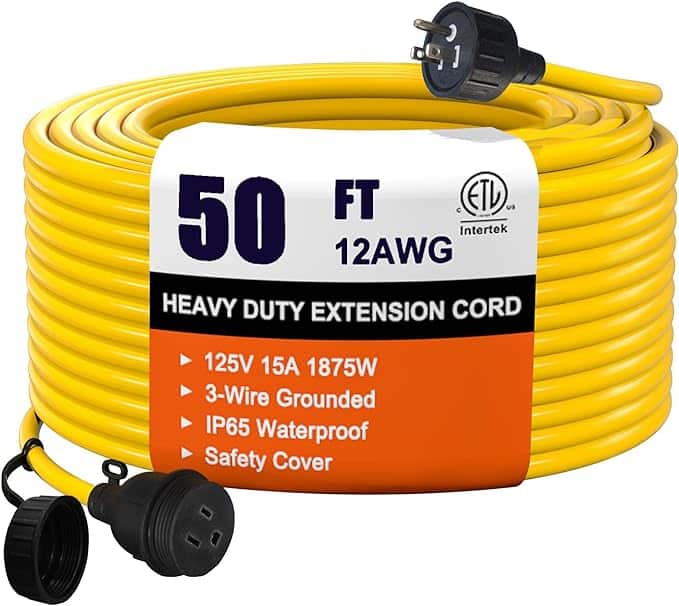
It’s crucial to choose a heavy-duty extension cord with a sufficient gauge for safe and efficient charging. For electric vehicles, a 10-15 extension cord with a gauge of at least 10 to 12 is recommended, ensuring it can handle the electrical load without overheating. A thicker gauge reduces resistance and voltage drop, enabling a more efficient flow of electricity during charging sessions.
I personally use a 50ft Tesla Model Y charging cable and can recommend this one. This extension cord proves especially handy in instances where the charging outlet is not within immediate reach, providing the necessary length and adequate power transmission capabilities to charge your EV effectively.
This came in handy for me on my Minnesota to Manitoba EV road trip, as chargers were unreliable and I had to trickle charge at hotels along the way.
9) Nema TT-30 Extension Cord
Similar to having a standard 5-15 extension cord, having a Nema TT-30 extension cord is a good idea to have in your EV charging adapter kit. If you are using a 30 amp plug at a campsite, having an extension cord will allow for some flexibility on where you park your car.
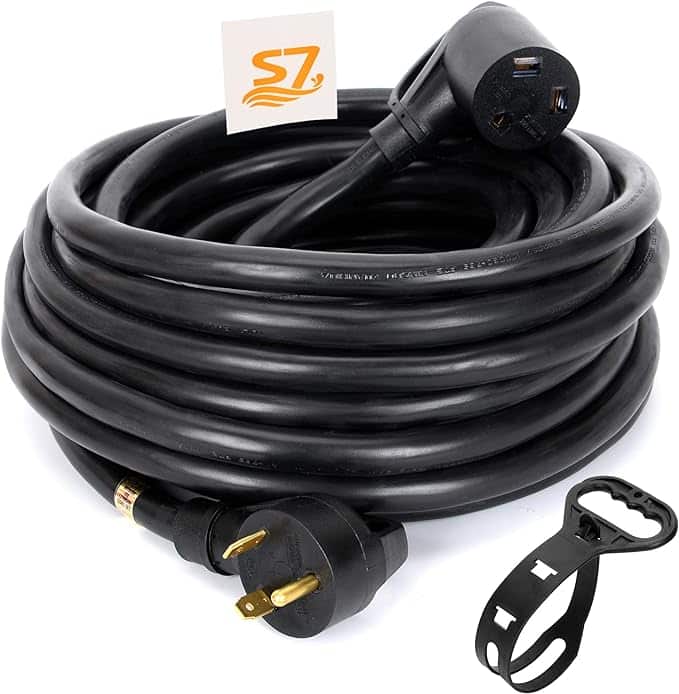
For me, this was handy to avoid having my car (and Tesla bed) next to the fire pit and all the smoke that comes with it.
10) Nema 14-50 Extension Cord
If you’re road-tripping in an EV—especially through remote or rural areas—a NEMA 14-50 extension cord can be a lifesaver. Originally designed for RVs and electric ranges, this heavy-duty cable allows you to plug into common 240V outlets, including the type often found for electric dryers in garages or utility rooms.
In a pinch, you can run the extension cord into a house or cabin to access a dryer plug, giving you a solid overnight charge when no public station is available. It’s an essential backup that adds flexibility, peace of mind, and a wider safety net for charging in less-developed areas.
BONUS: Back up Power
Technically not an adapter or cable, but absolutely one of the best add-ons you can bring on remote or long EV road trips—especially on routes like my recent run to the Arctic Ocean, or to Yellowknife and back, where range anxiety was very real.
I relied on this to power my Starlink setup during long drives, run camp lighting, and keep devices charged overnight without touching the car’s battery.
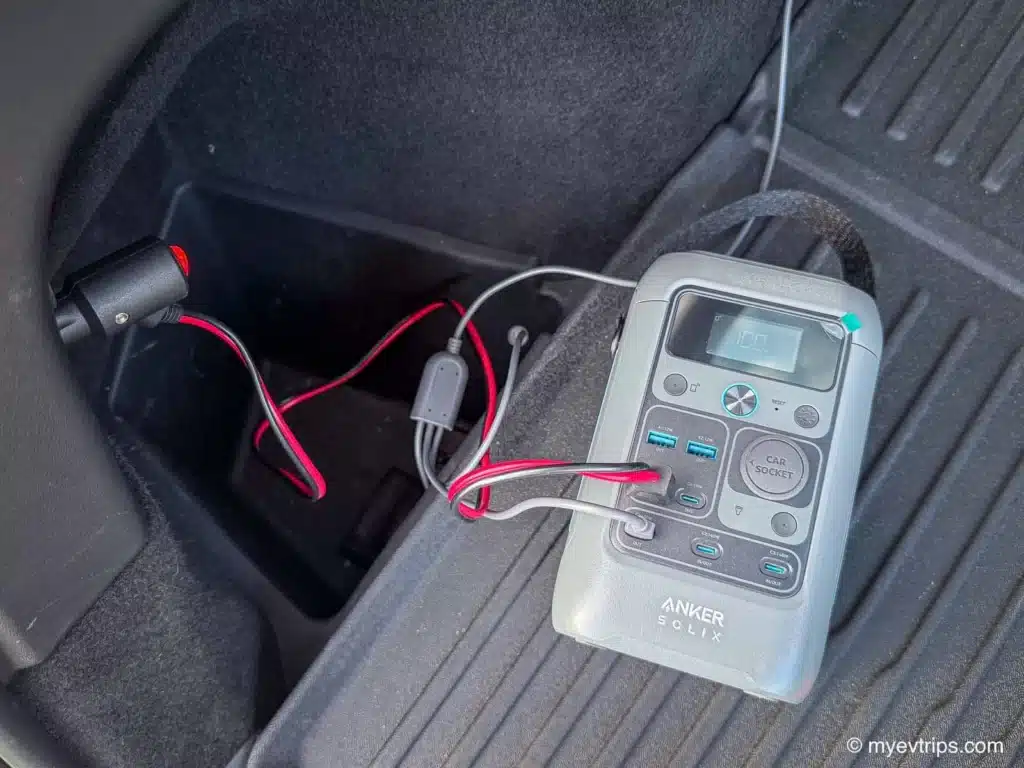
In my setup, I used the Anker C300 DC, connected to the Tesla’s 12V outlet through a kill switch. I’d flip it on while charging or once parked for the night so the pack could top up without cutting into driving range.
When it was time to fire up Starlink, I plugged it directly into the battery pack and stayed fully connected without draining the car.
What Tesla Ev Charging Adapters Do You Use?
In conclusion, exploring and acquiring diverse Tesla EV charging adapters and cables significantly boosts the flexibility and convenience of owning an electric vehicle. Each adapter serves a crucial purpose, whether broadening access to fast-charging networks with the Tesla CCS Adapter or providing alternative options in regions where CHAdeMO outlets prevail with the Tesla CHAdeMO Adapter.
Moreover, having a 10-15 extension cord with the proper gauge ensures adaptable charging solutions, especially in situations with limited charging station accessibility.
As you consider these essential charging accessories, we’d love to hear from you!
What EV charging adapters or cables do you currently use for your Tesla? And while we’re on the topic of handy gear, I’ve also been using the S3XY Strip, a clean ambient LED light strip that adds visibility and makes the cabin feel way more functional on long drives.
Share your experiences and preferred charging solutions in the comments below. Your insights can help fellow Tesla owners navigate and optimize their electric driving experience.
